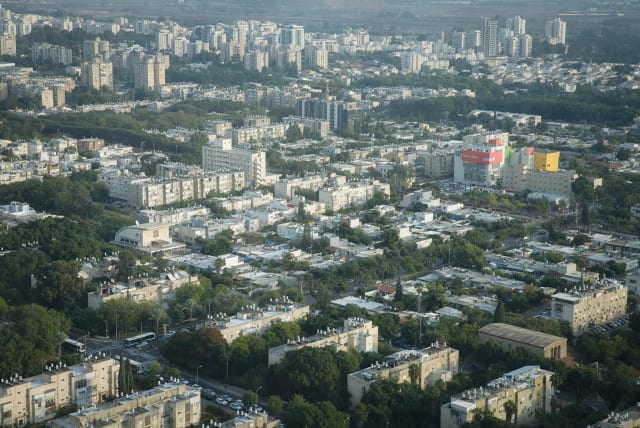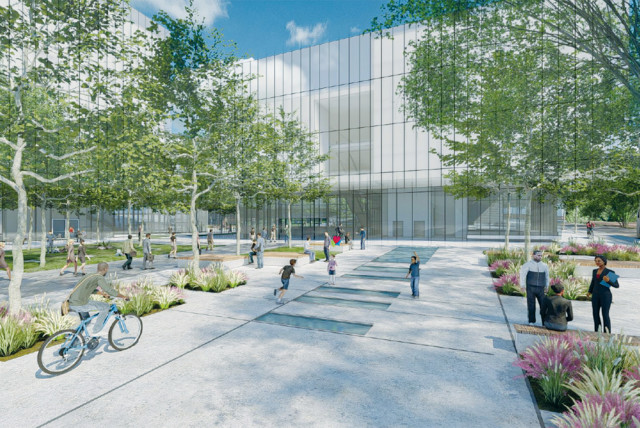The rehabilitation of Tel Aviv’s Yad Eliyahu

The often-overlooked neighborhood is currently undergoing a major face-lift that will bring top-tier academia and commerce to local residents.
Things are changing in South Tel Aviv. Last year, the opening of the David Kempinski Hotel brought a hint of luxury to the south of the Tel Aviv promenade. And the once-rugged neighborhood of Florentine has flourished to become one of the most coveted areas in the city.
Yet, a small jaunt even further south shows there’s still much work to be done, particularly in the Yad Eliyahu neighborhood.
A decade ago, Udi Carmely, head of Tel Aviv’s team for planning the eastern side of the city, described Yad Eliyahu as “paralyzed” and in dire need of urban renewal. Today, Carmely’s vision is finally coming to fruition.
The neighborhood, which is home to 19,000 residents and around 500 commercial units (offices and shops), is currently undergoing a real estate development boom, with Rotshtein Real Estate Ltd. building an urban renewal project at 35-45 La Guardia Street that will cost NIS 700 million ($190 million) and is set to bring in revenue of NIS 820 million ($222 million).
In light of the great importance that the municipality places on promoting urban renewal in the neighborhood, the municipal corporation Ezra and Bitzaron took it upon itself to lead various processes with the residents themselves.
“The Yad Eliyahu neighborhood is facing accelerated urban renewal aimed at improving the quality of life of its residents while preserving the characteristics of the neighborhood and green areas and renewing public spaces,” the Tel Aviv municipality said.
“According to the scheme, which is in line with the master plan delegated to the city, La Guardia Street will become the main urban street of the Yad Eliyahu neighborhood and of East Tel Aviv, and will be lined with commerce, wide sidewalks, and bicycle paths. In addition, the residential buildings along the street can be expanded and enlarged.”
Not all residents are impressed by these changes, especially the new apartment buildings that threaten to clog up traffic.
“Yad Eliyahu is a magnificent neighborhood that’s 75 years old,” Setla Avidan, CEO of the NGO called Green Yad Eliyahu, said. “It has beauty, it is green, it is a great community. There’s religious and secular here and we all live in harmony. But these overly ambitious real estate plans are concerning. They’re tearing down trees and we’re already seeing 10-15-minute traffic jams because of this construction.”
Moreover, its position at the epicenter of main arterial roads in the city and with plans for the new light rail to connect the neighborhood to Tel Aviv’s prominent HaShalom Road and Yehuda HaLevi Streets, Yad Eliyahu is perfectly positioned to be the city’s latest up-and-coming neighborhood.
In addition to real estate developers, Afeka College of Engineering is at the forefront of efforts to rejuvenate the area. The college signed a historic agreement this year to build its new $100 million campus in south Tel Aviv. The 42,000 square meter lot will be located southeast of the city, on the border of Yad Eliyahu and Kfar Shalem. The school is working in partnership with the city of Tel Aviv-Yafo, the Planning and Budgeting Committee of the Israeli Council for Higher Education, and private donors to build their new campus which will include academic buildings, advanced laboratories, and student dormitories.
A central pillar
THE PROJECT dovetails with a central pillar of the municipality’s vision and enormous investment in the renewal of the southern and eastern areas of the city. In doing so, it will also provide the infrastructure for significant development of a college training engineers for the hi-tech industry, which suffers from a significant shortage of skilled manpower.
“Over the past several years, Afeka has been pioneering strategic institute-wide change to enhance the relevance of our educational process and the workforce readiness of our graduates,” Afeka College President Prof. Ami Moyal, said.
“The new campus will serve as a platform for innovative engineering education and will also allow us to substantially increase the number of engineers entering the workforce each year, thus laying the foundation for the start-up nation’s continued growth.”
Local rejuvenation is exactly what the neglected neighborhood needs, considering many residents are struggling socioeconomically, with the Central Bureau of Statistics giving the residents a ranking of 4.6 on a scale of 1-10.
To date, the municipality has upgraded many boulevards and revamped its sports center and the local Galit Park to make public spaces more inviting. In fact, the plaza adjacent to the Yad Eliyahu Sports Hall – once a desolate wasteland – is now home to a NIS 7.7 million ($2.1 million) communal space which will be a source of pride to many local sports fans. The plaza features two ecological ponds, plenty of seating, greenery, a cafe, and an amphitheater.
Additionally, the municipality has also introduced a new communal workspace for young professionals. “Eliyahu” will serve as an extension of the current community youth center and is intended to be a comfortable place where one can plug in their laptop and get to work. With the addition of “Eliyahu,” there will now be seven youth centers in Tel Aviv that offer residents a place to host social initiatives and receive rental assistance, employment counseling, and legal advice.
However, when it comes to education in south Tel Aviv, the city has a lot of catching up to do. Even though the neighborhood has two elementary schools, Gibore Israel and Rokach, and a religious school, many parents opt to send their children to school elsewhere because standards are seen as subpar.
This is the case for Avital Shiner from Rockville, MD, who has lived in Yad Eliyahu since 2008, a mother of three who sent her two older kids to school outside the neighborhood, while her youngest attends school nearby. “My youngest goes to school here because I was hoping schools would improve and I really admire her principal,” she said. Yet, her hopes have remained unfounded as she feels the school is not adequately challenging her daughter who is in first grade.
The uphill battle to improve the local school system in South Tel Aviv is one of the reasons the Afeka College of Engineering was drawn to the area.
OVER THE past several years, Afeka has been at the helm of a pedagogical revolution and in turn, forging the future of the workforce in Israel as a whole. They began by defining the desired output of their education process, their so-called ultimate “graduate profile” that incorporates not only knowledge and engineering skills, but also vital personal skills and values.
Now, Afeka’s new model of teaching will finally have a new home.
The new campus comes at a vital time when there is an estimated shortage of 13,000 engineers and software developers in the Israeli hi-tech industry. This gap has been defined by the government as the main barrier for development in the hi-tech sector, with potential consequences to Israel’s national resilience and its international status as a beacon of innovation.
“Moving our leading academic institution to a developing neighborhood will help bridge societal gaps, bringing an influx of students, faculty, commerce, and facilities to the area. The Yad-Eliyahu campus will promote a socio-educational ecosystem that promotes excellence and innovation in science and technology as a basis for social mobility. The new dormitories on and around the campus, meanwhile, will provide much-needed access for the social periphery in the city and region,” Moyal said.
The hope is that the campus will serve as a magnet for students, faculty, commerce and facilities that will give the neighborhood a much-needed shot in the arm and put its residents on the path to social mobility.
As such, Afeka’s numerous social involvement programs aim to impact Israeli youth by exposing them to the beauty of science, technology, and engineering with age-appropriate activities led by Afeka students that are hands-on, enriching and fun. In doing so, the school is helping students pay forward and act as role models to youth who find the field of engineering daunting or unattainable.
The college is planning to be far more than an impressive brick and mortar presence though, as it’s actively engaging in community outreach.
“As a public institute for higher education, we believe it is our obligation to actively contribute along the entire national K-12 STEM education continuum, with the goal of reaching every part of the country, particularly the geographical and social periphery. Afeka leads numerous programs aimed to impact Israeli youth by exposing them to the beauty of science, technology, and engineering. We have also taken on a strategic role of using the experience and insights we gained while transforming our own educational process to motivate a holistic approach to STEM education on local, regional and national levels,” Moyal added.
The Tel Aviv municipality echoed this sentiment, calling the project “a central pillar” of its vision for the renewal of the southern and eastern areas of the city, providing “the infrastructure for significant development of a college training engineers for the hi-tech industry, which suffers from a significant shortage of skilled manpower.”
While Shiner is skeptical that a college will be able to turn the system around, she is welcoming the new campus with open arms and hopes Afeka’s vision becomes a reality.
“I admire anybody who wants to come here and is passionate about changing things for the better,” she said. “And positive change is already happening.”
Jerusalem Post Store
`; document.getElementById("linkPremium").innerHTML = cont; var divWithLink = document.getElementById("premium-link"); if (divWithLink !== null && divWithLink !== 'undefined') { divWithLink.style.border = "solid 1px #cb0f3e"; divWithLink.style.textAlign = "center"; divWithLink.style.marginBottom = "15px"; divWithLink.style.marginTop = "15px"; divWithLink.style.width = "100%"; divWithLink.style.backgroundColor = "#122952"; divWithLink.style.color = "#ffffff"; divWithLink.style.lineHeight = "1.5"; } } (function (v, i) { });

